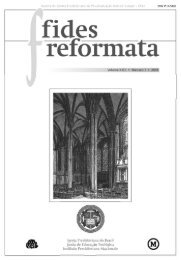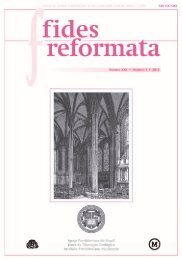Fides 22 N2
Um publicação do Centro Presbiteriano de Pós-graduação Andrew Jumper.
Um publicação do Centro Presbiteriano de Pós-graduação Andrew Jumper.
You also want an ePaper? Increase the reach of your titles
YUMPU automatically turns print PDFs into web optimized ePapers that Google loves.
FIDES REFORMATA XXII, Nº 2 (2017): 139-162<br />
Africa, and the New World were under the power of Spain and Portugal – both<br />
Roman Catholic countries. Pointing to the Dutch East India Company, founded<br />
in 1602, which “stated that one of its objectives was to plant the Reformed<br />
Faith in its territories overseas,” Kane asserts, “seldom did they work at it.” 79 This<br />
again is a bold conclusion for which Kane offers no documentation, nor gives<br />
any indication of having researched even the secondary literature dealing with<br />
the primary sources about the work of the Dutch companies (East and West). 80<br />
Kane’s fourth factor is “the absence in the Protestant churches of the religious<br />
orders which played such prominent role in the spread of the Catholic<br />
faith throughout the world.” 81 Just as Neill accepted Bellarmine’s critique, so<br />
Kane simply quotes a critique from Joseph Schmidlin, a Roman Catholic mission<br />
historian. 82 To put Kane’s argument in contemporary terms, a key reason<br />
for the supposed indifference of the reformers towards the evangelization of<br />
the world was the lack of para-church organizations. Do the Scriptures ever<br />
teach or encourage any other group outside or parallel to the church to carry<br />
out the evangelization of the world. Kane, along with some other mission<br />
historians, downplays the fundamental place of “pure doctrine” and especially<br />
ecclesiology – the doctrine of the church – presented, defended, and lived by<br />
reformers like John Calvin.<br />
2.3.2 Ralph Winter’s Arguments<br />
Ralph Winter, in his “Perspectives” course states:<br />
Here we go again – despite the fact that the Protestants [during the Reformation<br />
period] won on the political front, and to a great extent gained the power to<br />
formulate anew their own Christian tradition and certainly thought they took<br />
the Bible seriously, they did not even talk of mission outreach. 83<br />
He goes even further, making a non-historical statement, when he asks<br />
and answers a question.<br />
79 Ibid., 75.<br />
80 Part of the work of the Dutch West India Company has been well researched by Frans L.<br />
Schalkwijk. The work of the Dutch India companies will be considered in the reply to the mission historians<br />
presented in chapter 5.<br />
81 Kane, A Concise History, 75.<br />
82 Schmidlin’s critique of the leaders of the Reformation has already been addressed by Samuel<br />
Zwemer when he commented on the literature already available in the German language in Theology Today<br />
7 (July 1950) 2:206. For an extended commentary on Zwemer, see the chapter of my Ph.D. dissertation<br />
dealing with the “Contemporary Mission Historians and the Reformation Period: A Literature Review.”<br />
83 Ralph D. Winter, ed., “The Kingdom Strikes Back: Ten Epochs of Redemptive History” in<br />
Perspectives of the World Christian Movement: A Reader (Pasadena: William Carey Library, 1999),<br />
chapter 33; 211. This document is available online at: http://www.uscwm.org/mobilization_division/<br />
resources/perspectives_reader_pdf’s/B01_Winter_ TheKingdom.pdf.<br />
157




